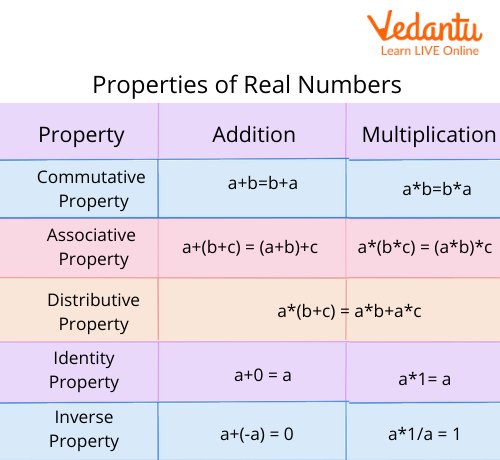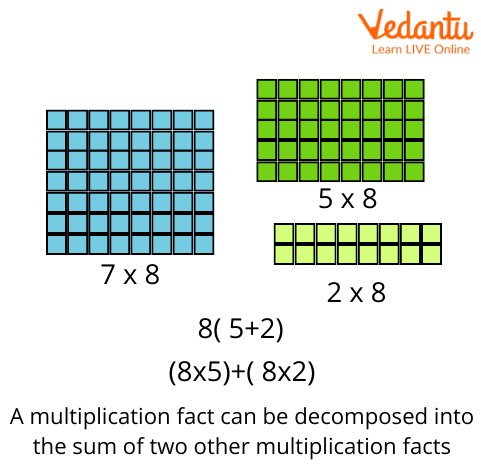




Learn How Associative, Commutative, and Distributive Laws Make Multiplication Easier
Multiplication is an important aspect of Mathematics and involves different properties for solving differential equations. There are about six different properties of whole numbers which help in solving differential equations according to their rules. The six different properties of multiplication include the following:
Zero Property
Identity Property

Properties of Real Numbers
The properties of multiplication have to go along with the properties of whole numbers, given above, to produce the appropriate answers and results. These properties provide accurate results when one has to solve for the long and bigger numbers. Let us dive into the properties of multiplication in detail in the next section.
Closure Property for Multiplication
In easy words, the closure property states that if two whole numbers say, a and b are multiplied together, a x b then the result of the multiplication will also be a whole number.
It's a rule that when whole numbers are multiplied then the result will also be produced as a whole number. Hence, to verify this property of multiplication, let's look at the examples.
Example: 8x9= 72
Here, both 8 and 9 are whole numbers and the result, 72 is also considered to be a whole number.
Some other examples include:
2x5= 10
5x7= 35
7x11= 77
Commutative Property for Multiplication
The commutative property states that the order of two multiplicative numbers does not change the product and the answers remain the same even if their orders are changed.
a x b = b x a
Example: 6 x 3= 18 & 3 x 6 = 18
Hence, we can prove here that the numbers multiplied in either way produce the same results irrespective of their places.
Some more of the examples include:
7 x 8 = 56 & 8 x 7 = 56
12 x 2 = 24 & 2 x 12 = 24
7 x 6 = 42 & 6 x 7 = 42
Multiplication by Zero
The property of multiplication by zero states that if any number is multiplied by zero the result is always zero.
a x 0 = 0 or 0 x a = 0
Example: 22 x 0 = 0 or 0 x 22 = 0
Therefore, the result proves that any number multiplied with zero irrespective, the result is always supposed to be 0.
Some other examples include:
37 x 0 = 0 & 0 x 37 = 0
4 x 0 = 0 & 0 x 4 = 0
Identity Property of Whole Numbers
This property states that if any whole number when multiplied by 1 produces the number as result itself.
Considering if 'a' is a whole number, which is multiplied by 1, we will get:
1 x a = a or a x 1 = a
Example:
1 x 7 = 7 ( 1+1+1+1+1+1+1 = 7)
2 x 1 = 2 ( 1+1 = 2)
1 x 342 = 342
The number 1 is considered as the multiplicative identity for the whole numbers since it does not change the value of numbers.
Associative Property of Multiplication
The associative property involves the multiplication of three whole numbers. It states that if any three whole numbers are multiplied in any manner or order, the answer always remains the same.
Let, a, b and c be three whole numbers:
(a x b) x c = a x (b x c)
The associative property ensures that the product or the answer of the multiplication remains the same irrespective of the placement of the numbers. The associative property applies to three or more numbers during multiplication.
Example:
(2 x 3) x 6 = 36
(3 x 6) x 2 = 36
(6 x 2) x 3 = 36
Distributive Property of Multiplication
The distributive property states that when the addition of two numbers is multiplied by the third number, the answer is always equal to the sum of two products.
Let a, b, and c be three whole numbers:
a x (b + c) = a x b + a x c
Thus, we say that the multiplication of numbers distributes over the addition of their numbers.

Distributive Property
Example:
2 x (7 + 3) = 20 and 2 x 7 + 2 x 3 = 20
3 x (1 + 4) = 15 and 3 x 1 + 3 x 4 = 15
Summary
The different properties of multiplication help us to solve elaborate questions efficiently and with accuracy. These different properties are quick and easy to use and can be used in different methods. We hope you now have a clear understanding of what the different properties of multiplication are and can apply them to accurately while solving problems. You can visit our website to get hold of worksheets on the topic or access other interesting Maths topics.
FAQs on Properties of Multiplication Explained with Examples
1. What are the four main properties of multiplication I need to know?
The four fundamental properties of multiplication that help in solving problems more easily are:
- Commutative Property: Changing the order of numbers does not change the product (e.g., 5 × 3 = 3 × 5).
- Associative Property: Changing the grouping of numbers when multiplying three or more numbers does not change the product (e.g., (2 × 3) × 4 = 2 × (3 × 4)).
- Distributive Property: Multiplying a number by a group of numbers added together is the same as doing each multiplication separately (e.g., 4 × (5 + 2) = 4 × 5 + 4 × 2).
- Identity Property: The product of any number and one is that number itself (e.g., 9 × 1 = 9).
2. How can I easily tell the difference between the associative and commutative properties?
The easiest way to tell them apart is to look at what is changing. The commutative property is about the order of numbers. For example, 2 × 8 is the same as 8 × 2. The numbers move around. The associative property is about the grouping when you have three or more numbers. The order stays the same, but the parentheses (or the group you calculate first) move. For example, in (3 × 4) × 5 and 3 × (4 × 5), the numbers 3, 4, and 5 are in the same order, but the grouping changes.
3. Why is the distributive property so important for solving difficult multiplication questions?
The distributive property is extremely useful because it allows you to break down a large, difficult multiplication problem into several smaller, easier ones. For example, to calculate 18 × 105, you can break 105 into (100 + 5). The problem becomes (18 × 100) + (18 × 5), which is 1800 + 90 = 1890. This makes mental maths much faster and reduces calculation errors.
4. What exactly is the multiplicative identity and why is it called that?
The multiplicative identity is the number 1. It's called the 'identity' property because when you multiply any number by 1, the number keeps its original identity and doesn't change. For example, 25 × 1 = 25. The number 25 remains 25. This is a special property because 1 is the only number that does this for all other numbers in multiplication.
5. Is there a 'zero property' of multiplication?
Yes, there is. The zero property of multiplication states that the product of any number and zero is always zero. For example, 45 × 0 = 0. This is a simple but powerful rule because it means that if you see a zero in a long chain of multiplications, you know the final answer will be zero without needing to calculate the rest.
6. Do these multiplication properties apply to negative numbers as well?
Yes, all these properties work perfectly with integers, which include negative numbers. For instance:
- Commutative: (-5) × 3 = -15, and 3 × (-5) = -15. The order doesn't matter.
- Associative: (2 × (-4)) × 3 = -24, and 2 × ((-4) × 3) = -24. The grouping doesn't matter.
- Distributive: -2 × (3 + 5) = -2 × 8 = -16, and (-2 × 3) + (-2 × 5) = -6 + (-10) = -16.
The rules remain consistent, which makes them very reliable for solving all kinds of Maths problems.
7. How can understanding these properties help me in real-life situations?
Understanding these properties makes everyday calculations much quicker. For example, if you're buying 7 items that cost ₹25 each, you might find 7 x 25 difficult. But using the commutative property, you can switch it to 25 x 7. You might know 25 x 4 is 100, so you can think of it as (25 x 4) + (25 x 3) using the distributive property, which is 100 + 75 = 175. This helps in budgeting, shopping, and any situation requiring quick mental maths.























